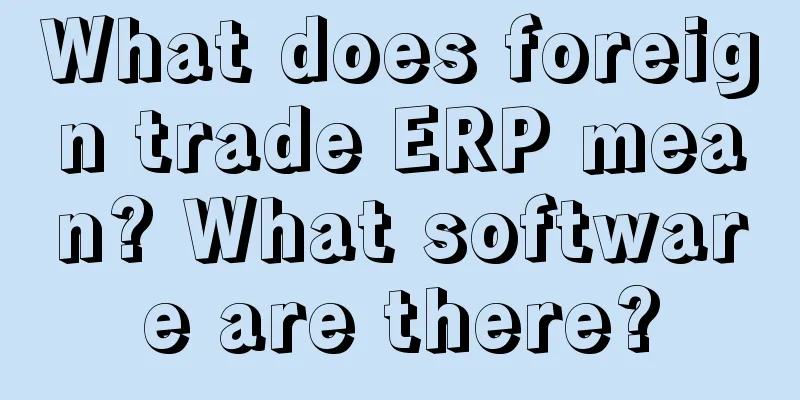Turning hot spots into brand memories, reviewing 5 best marketing cases of the year

It’s 2023, why are there still so many brainwash advertisements in elevators? It must be admitted that "making people remember" has always been a difficult problem for any brand. In this era of more scattered attention, there are not many channels that can deliver information to users in a concentrated manner. However, brainwashing advertising, a simple and crude form that seems to be more certain, still makes some brands "unforgettable". Although it is not the best choice, it is often just a helpless move. Because when brand content can be discussed and shared by everyone, the difficulty and uncertainty of dissemination will be greatly increased. It is always difficult to spread the boasting of achievements, but an accidental failure can cause ripples. This is the so-called "good news doesn't go out, but bad news spreads a thousand miles." It is always ten thousand times more difficult for positive information to break through the circle. Why are there always "lucky people" who can create phenomenal screen-sweeping events and win "huge wealth"? Not only can they be remembered, but they can also leave a good reputation. In addition to envying their "unforgettable" opportunities, we might as well unravel the mystery and sort out the context. Hot products may not be copied, but they can still be learned. Daofa selected 5 representative brands from the marketing cases in 2023. In the past year, they did not rely solely on traditional advertising, but acted more as event initiators or participants, allowing the public to reach a collective consensus, thus leaving a deep brand memory in the minds of consumers. Although the forms are different, these five brands have all used some "reverse marketing" thinking in their communication. Different from the traditional marketing logic from top to bottom, from strategy to tactics, "reverse marketing" starts from the feelings of the general users . The thinking seems unexpected, but it is logical in capturing emotions. 1. BYD: In a real business war, would it be better to “retreat in order to advance”?For car brands, 2023 may be the most turbulent year in history. Recently, a media outlet published an article titled "How many fights did Chinese car companies have in 2023?", which recounted the various "fights" among car companies this year. The fierce competition in the market, coupled with the fact that car company executives are increasingly accustomed to making high-profile statements directly on Weibo, has made many consumers become spectators - "Look, these two companies are on the hot search again." It is true that they have gained exposure, but how many people will be convinced by the tit-for-tat debate and fall in love with this brand? Among the countless car wars this year, the most "rebellious" and impressive one was the "Together, we are Chinese cars" shouted when BYD rolled off the 5 millionth new energy vehicle in August. On the evening of August 9, BYD held a ceremony to roll out the 5 millionth new energy vehicle at its Shenzhen headquarters. At the press conference, BYD Chairman Wang Chuanfu said that it was not easy to make cars and choked up several times. Outside the venue, BYD set up an exhibition area with the theme of "Together, we can make Chinese cars" and displayed representative models of many Chinese car companies. Subsequently, Chery, Hongqi, Ideal, Xiaopeng and other car brands that were "saluted" also expressed their support and recognition through their official Weibo accounts. The topic online was fermenting in sync with the offline. Most netizens and media expressed their favorable impression of BYD's "operation", praising its "full scale". The two core videos received nearly 40 million views on the Weibo platform, and the Weibo topic #BYD's 5 millionth new energy vehicle rolled off the assembly line# also accumulated 390 million views. You know, the starting point of this communication was to "show off" in production and sales, but BYD did not follow suit in choosing the theme to express itself, and did not brag about the "5 million" power. Instead, it used a way of paying tribute to the Chinese auto industry and implicitly put BYD into the coordinate system. It can be said that it grasped the social sentiment of the Chinese society, especially in the tense environment of the past two years, which is a natural yearning for "pattern" . Such a topic fermented from Weibo and gradually spread to the entire network, becoming a hot topic of concern to the whole people. Of course, if public opinion was only one-sided, it would not have spread to such an extent. There is no lack of controversy in professional circles. An executive of a competing auto brand publicly expressed opposition, saying that Chinese auto companies must face the reality of competition, "It's better to fight first and then get together." On Weibo, many opinion leaders also expressed their views. Big V @理记 commented on its logic: "For ordinary audiences, who can not cry for the great development of China's manufacturing industry? The strength of the film is that even if you are not a fan of BYD, the film praises other companies. BYD is not even very impressive. How can you object? As for people outside the automotive industry, they are even more excited for the country's progress." Of course, this wave of operations has also increased the social expectations and pressures faced by BYD. Fortunately, its performance continued to grow in the second half of this year, firmly sitting on the top of the domestic passenger car market, and its new brands Yangwang and Fangchengbao have also attracted much attention. Before this year, how many people would associate the name BYD with a "national brand"? 2. Jie Rou: How did the “mistake” turn into a marketing opportunity after turning the tide of the oolong incident?How should the brand respond after the oolong incident became a hot topic? In September this year, the 45-year-old Chinese brand Jie Rou's handling of the "wrong price input in the live broadcast" issue was a textbook-level public relations and marketing case of the year. Topics such as #Jie Rou's live broadcast room input the wrong price and lost tens of millions#, #Jie Rou responded to the price of 6 boxes of paper towels at 10 yuan#, #Jie Rou wrote a thank-you letter to thank the customer who canceled the 10 yuan 6 box order#, and #How good are the employee benefits of old Chinese companies# were all on Weibo's hot search in a short period of time. On September 17, due to the wrong price setting, the operation of Jie Rou's live broadcast room set the original price of 56.9 yuan per box of paper towels to 10 yuan for 6 boxes. This triggered many users to place orders and rush to buy, and the final number of orders exceeded 40,000. When such an accident occurs, most brands often choose to "cancel the order" and give consumers coupons as compensation. However, Jie Rou chose to ship normally. Two days later, the brand issued an official response, saying that the loss reached 10 million yuan, but all "10 yuan for 6 boxes of paper" orders will be shipped, and users who need a refund can negotiate other solutions. Afterwards, #洁柔直播间入错价失千万# became the most searched topic on Weibo, with 360 million views. Most netizens praised Jie Rou's business model, while others believed that Jie Rou should not indulge "wool party" and suggested limiting the number of shipments. At the same time, many users were moved by Jie Rou's official attitude and took the initiative to apply for a refund without compensation. Jie Rou's subsequent actions once again made it a hot topic. Unexpectedly, Jie Rou sent a thank-you letter to the user who took the initiative to apply for a refund, and invited them to become an "honorary Jie Rou employee" to participate in the 45th anniversary celebration held in Guangzhou, and provided anniversary gift boxes, new product trials, in-app purchase prices and other benefits, and even provided internships and jobs for their family members. This wave of surprise benefits to give back to "kind-hearted people" once again triggered heated discussions among netizens, and the hot topic became "How good are the employee benefits of old domestic companies?" Jie Rou became a "fairy company" in the eyes of netizens. Daofa believes that the "sincere and non-routine" communication attitude shown by Jie Rou in this incident, as well as the tangible material feedback provided, far exceeded consumers' psychological expectations . After the price blunder, Jie Rou faced a critical decision, and improper handling could easily lead to negative consequences. The usual approach is to keep things quiet, but Jie Rou took advantage of the public opinion attribute of Weibo and used hot searches as a communication scenario directly facing consumers, which not only won social favor, but also made a group of users upgrade their understanding of the brand to preference. For consumer brands of a certain scale, it is difficult to avoid problems of all sizes from fermenting on social media platforms and becoming hot topics. Reducing the heat and keeping things quiet are not the only solutions, because there is also a high communication value in this . Negative events bring much more traffic than positive communication, but they are also a great opportunity for brands to win big with a small investment and re-establish awareness. 3. Bawang Tea Princess: The era of overconsumption is over, and “low burden” is also an emotional valueIn recent years, new tea drinks can be said to be the type of brand that has the most traffic and is the most searchable. There are collective performance art like #AutumnFirstCupMilkTea#, crazy collaborations with celebrities and IPs almost "once every three days", and of course, there are also public opinions on food safety, service experience and other aspects. As a typical emotional consumption product, consumers’ loyalty to new tea brands is actually relatively low. According to surveys by multiple data agencies, the figure is generally below 20%. While major brands continue to attract repeat purchases with new joint names and flavors, consumers’ anxiety about sugar, fat, caffeine and other ingredients has never diminished. “Should we quit milk tea?” has always been a potential pan-social emotion. Bawang Chaji, which mainly promotes whole-leaf fresh milk tea, has long since turned this insight into practical action. For example, for its hit product "Bo Ya Jue Xian", it has twice officially announced the formula through Weibo, WeChat and other platforms: in response to consumers' curiosity about the product ingredients, "What's in a Cup of Boya Jue Xian" disclosed the ratio of tea soup and milk to show the purity of the ingredients; "How many calories are in a cup of Boya Jue Xian" responded in detail to consumers' concerns about calories and nutritional content, and the poster of "half an avocado" analogizing the calories of milk tea was deeply rooted in people's hearts. But what really promoted the recognition of "healthy milk tea" was a series of marketing campaigns this year. In mid-August, Bawang Chaji took the lead in launching the first "product ID card" in the tea beverage industry, disclosing the product ingredients, product calories and nutritional elements, product flavor table, etc., and providing third-party testing certificates. #Does the milk tea you drink have an ID card# This topic was interviewed by many media such as Guancha.com, Mammoth News, and Life Times, as well as the popularization of the cognition of "healthy milk tea". These views were released on Weibo in advance, achieving over 50 million exposures, and creating the first wave of recognition. In September, Bawang Cha Ji went a step further and pioneered the "calorie calculator" function for tea drinks. Consumers can access the calorie calculator through Bawang Cha Ji's official account, mini-programs and other platforms to achieve customized and personalized calculation of calories and other product nutritional information. At the same time, Bawang Cha Ji also launched the "100 calories for Bawang Cha Ji" challenge in conjunction with Keep. After consumers successfully complete the sports challenge, they have the opportunity to win exclusive prizes. This wave of innovation has attracted wider attention, and the topic on Weibo has reached 300 million. One netizen commented: "The guilt of drinking milk tea has been reduced again, let's have a cup tomorrow!" It can be said that it is precisely because of the insight into consumers' pursuit of delicious and healthy tea that Bawang Chaji will continue to "add" to health and "subtract" from products. In addition to the big theme of health, "low burden" is the emotional value that today's consumers need more . Bawang Chaji's solution is to let more people understand the product's calorie standards and low-burden product characteristics through in-depth interaction, making health indicators perceptible. This is also due to Bawang Cha Ji's close attention to the potential trends on social media platforms. As Xu Chi, general manager of Bawang Cha Ji's brand marketing center, mentioned in a conversation with Daojie Doris, they observe the emotions of users on platforms such as Weibo and hope to do things that can truly "empathize with users." 4. Deyou: Breaking common sense is the best way to market topicsCan wet toilet paper be used to wipe the face? If you have this question, then Deyou wins. In February this year, Deeyeo joined hands with a number of leading blue V media to create the Weibo topic #Can wet toilet paper be used to wipe the face#, which quickly ranked 6th on the hot search list. The category of wet toilet paper, thanks to Su Xing from the "Re-employment Boy Group", has been trending on the Internet since April last year. In the topic #Su Xing wiped my face with wet toilet paper and laughed to death#, Su Xing held a pack of wet toilet paper in the program and questioned: "What is the toilet paper for... Isn't wiping my face the same as admitting that my face is..." The scene was so funny that it quickly spread among the public. From this trending search, Deyou not only quickly signed Su Xing, who had his own traffic at the time, and promoted his "re-employment", but also accurately perceived a good opportunity in the education market. On the one hand, there is a knowledge gap in the market. At that time, there were indeed many consumers like Su Xing who did not think or know that wet toilet paper could be used to wipe the face, so they thought this move was ridiculous. On the other hand, the paper usage scene is closely related to consumers and has great potential for hot searches. From a communication perspective, whether a topic can trigger widespread discussion depends on whether the general public can "interject". As a necessity of life, paper towels and how to use paper are common sense in life, which is a topic that almost everyone can interject. This is why Deyou took the lead in spreading #Can wet toilet paper wipe your face#, a topic that was already proven to be popular last year, before officially announcing Gong Jun as its spokesperson this year. Anti-common sense is the core of Deyou's Weibo communication this time . On the one hand, it challenges the common sense of traditional toilet paper. Common sense is usually the knowledge that people take for granted. If there is no credible reason or reliable evidence, it is very difficult to change. On the other hand, it is anti-traditional marketing "top-down" common sense. Compared with the traditional brand communication logic of "first fans, then the public", Deyou does the opposite: first the public, then the fans. Swipe left and right to see more In subverting the common sense of paper use, Deyou mobilized blue V media such as @Daily Economic News and @China News Weekly to present evidence and facts, popularizing why wet toilet paper is better than ordinary toilet paper, successfully arousing public attention and heated discussion. Not only did it change the deep-rooted consumer perception, but it also left a brand memory of Deyou in their hearts. This wave of operations was very successful, with a total Weibo topic reading volume of 240 million, an increase of more than 60 times compared to last year's 3.94 million readings. Why did Deyou choose the approach of "first the public, then fans"? First of all, it is fighting a category recognition war for vertical brands. "Wet toilet paper to wipe the face" is an excellent user education scenario, which makes "wet toilet paper" and "clean" smoothly equated. When the category gains the trust of the public, it is the space for the brand to play. Later, Deyou officially announced the spokesperson Gong Jun, launched the slogan "People who love cleanliness use Deyou", and really started to operate brand fans. Daofa believes that the most important reason for Deyou’s successful operation this time is that Deyou can keenly perceive the hot topics related to itself and knows how to tap the marketing potential behind the topics. Therefore, one year later, it can "re-create" the topics and re-carve Deyou's brand imprint. 5. Lao Xiang Ji: There are so many Blue Vs, why is it the only one that has become a hot search?"There is no free lunch in the world." Anyone who says this again will be slapped in the face. In October this year, Hometown Chicken celebrated its 20th anniversary by hosting a free banquet in more than 1,000 stores across the country. This “treat marketing” immediately topped the trending search list. With a total of 510 million views, its reach is evident. However, after searching, we found that Hometown Chicken has had a tradition of entertaining consumers since 2018. So, in addition to the large-scale banquets across the country, what did Lao Xiang Ji do right to cause this phenomenal marketing? First of all, Hometown Chicken has real ingredients and is capable of taking on the temporary popularity of the topic. In other words, it leaves a great first impression in the minds of new customers who are looking to join in the fun and get a bargain, thus creating a good brand memory. Giving back to consumers is a commonplace for brands, but many activities disgust consumers because what some brands say and what they do are completely different. Therefore, after hearing about this event, many people's first reaction was: "It only said free meals! It didn't say free vegetables!" However, Lao Xiang Ji actually used its own signature dishes to launch two sets of meals, plus souvenirs, with zero threshold to receive. Swipe left and right to see more Homemade Chicken is truly “free”, but things haven’t been smooth sailing. During the 20th anniversary banquet, there were many complaints. For example, many netizens said that “the people lining up were all elderly people.” If a brand doesn’t handle this situation properly, it will be pushed to the forefront, and the originally well-intentioned banquet will become a tricky public relations event. However, Shu Congxuan, chairman of Lao Xiang Ji, immediately responded on Weibo: "There is no threshold for this event. All I want is to invite neighbors to have a meal to celebrate a happy event at home. There is no need to distinguish between anyone and no need to be too utilitarian. It is simple, direct and down-to-earth. I just feel bad about making everyone wait in line." He not only patiently explained the reason and sincerely apologized, but also provided a solution. His sincere attitude once again won praise from the public. Such proper handling is due to the fact that Lao Xiang Ji continued to pay real-time attention to consumers' feedback on social platforms and gave timely feedback throughout the event. Swipe left and right to see more Lao Xiang Ji's protection of consumers on social platforms and consumers' love for Lao Xiang Ji are not only reflected in this banquet. Previously, Lao Xiang Ji posted "cluck, cluck, cluck" Weibo day after day, which attracted ridicule and interaction from consumers. Lao Xiang Ji's series of wonderful operations also made it a hot search among netizens: the chairman tore up the joint letter of employees' salary cuts, the 1980s rustic press conference, the spokesperson Yue Yunpeng called a duck a chicken, Lao Xiang Ji's self-examination and self-correction, Pharaoh Lao Xiang Ji... DaoFa believes that the reason why Lao Xiang Ji can stand out among the "pretentious" blue Vs is that it can interact with users in a "down-to-earth" way. In other words, it is to truly understand consumers and communicate effectively, not to be pretentious, speak human language, and sometimes even self-deprecatingly call itself "chicken claws" . Only by maintaining the relationship with consumers bit by bit on a daily basis can it have the physique of frequently appearing on hot searches. 6. CommentsAlthough the above five brand cases have different approaches, they are actually responding to public sentiment in their own way, whether it is the yearning for pattern, the worry about heat, the pursuit of cleanliness, or the natural liking for honesty. The forms they adopt are also innovative, fully mobilizing the public's desire to discuss and share. This is also the premise for them to achieve "positive out of the circle". Public sentiment ferments into hot topics on social media, and traffic will eventually fall back to the brands. However, we can see that these brands do not just rely on hot topics to gain short-term traffic benefits, but truly transform hot topics into users' memory of the brand, and even trust and support . Behind this, in fact, it is inseparable from the four key steps of "scientific insight, breaking the circle of cognition, expressing value, and building trust." Author: KUMA, Rolyn Source: Knife Skills Research Institute (ID: DigipontClub). |
<<: The number of views exceeded 5 billion, and "Southern Little Potato" was crowded in Harbin
>>: When building a brand, what exactly is a good product?
Recommend
In order to find out the secrets in the phones of old babies, I studied 100 middle-aged and elderly TikTok accounts
What types of content do middle-aged and elderly u...
Is a foreign trade salesperson a salesperson? Is it easy to do this?
When we talk about foreign trade, we often think o...
Top 10 predictions for China's Internet in 2023
Under the epidemic, the uncertainty of the industr...
The average GMV per game is less than 25,000. The Oriental Selection has hit a wall.
Oriental Selection recently developed a new busine...
How can new Amazon sellers quickly place orders? What are the categories that place orders the fastest?
As one of the world's largest e-commerce platf...
Beverage brand Liquid Death relies on "funeral style" to capture hardcore fans?
Exploring new boundaries of brand marketing, Liqui...
How to settle the shipping fee of Shopee Taiwan? What is the calculation method?
There are many domestic merchants opening stores o...
Amazon store naming tips, more fashionable cross-border e-commerce names
A good store name can make you stand out from your...
How to report Amazon misplaced categories? How to choose the right category?
In the vast world of Amazon products, each product...
Cross-border e-commerce reaches a "new starting point"
As global e-commerce competition becomes increasin...
Will column-based operations definitely increase community activity?
Those who run community groups all hope that the g...
Can Douyin save second-hand e-commerce?
The problems currently faced by second-hand e-comm...
The live streaming rooms are getting more and more expensive. Are “Li Jiaqi” abandoning the working people?
With the development of the live broadcast e-comme...
Xianyu launches "seafood perfume"; 1 point gives away wooden fish; Adidas uses shoe boxes as shoes... This is how you should do April Fools' Day marketing!
April Fools' Day is a great opportunity for br...
What does the popularity of "Black Plum Sauce" reflect?
I believe everyone has been brainwashed by the son...









